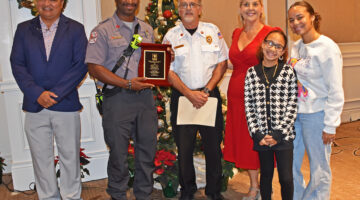Home For The Homeless
By Rick Boettger
I met with Rev. Stephen Braddock to discuss the recent forum on decriminalizing homelessness, which ran three hours at the Harvey Government Center. Four guest speakers laid it out: anti-panhandling ordinances and the like don’t work, are expensive, and mostly illegal: the only solution is providing housing for all.
Stephen knows more about problems and solutions for homelessness than anyone else in the Keys, having run the very successful Florida Keys Outreach Coalition for decades, and KOTS for 8 years. His FKOC not only provides housing, but changes the lives of most of its participants. The catch: they have to become and remain substance-free, be employed or do community service, and actively work toward achieving stability and self-sufficiency.
So: what can we do with the homeless who want to indulge, or be bipolar either through avoiding their meds, or their meds don’t work? Right now, we let them live on the street, sleep in the mangroves or at KOTS, while we spend lots of money on them, mainly at the emergency room and the jail. At the forum, we were told it’s cheaper to provide them housing, while actually helping out them and their communities.
Various studies seem to support this. Denver studied all of the usual homeless costs for two years before and after they were given housing. The costs of utilization of emergency room care, inpatient medical and psychiatric care, detox services, incarceration, and emergency shelter dropped by over $15,000/year per person. The cost of the housing and services was $13,000/year, making it cheaper for us taxpayers by $2,000/year per homeless person. And it’s way better for the homeless. They got sick less. Fewer police hassles. They also were then able to get more public assistance, having an address. Some even got back into society.
Providing housing for everyone sounds ridiculously pie-in-the-sky. So did Social Security, Medicare, the interstate highway system, going to the moon, everyone owning a car, etc. Look at how far we’ve come in just a decade with these incredible smart phones. America could more easily house everyone than accomplish any of the above miracles.
Even here in Key West we the people own plenty of buildable land. Many infill lots expected to sprout buildings are still empty in Poinciana Plaza 12 years after the Navy gave us the land. First, put up workforce housing, where the usual height limits don’t apply, and we still have space for a few hundred homeless units. Yes, I know, it sounds as crazy as Medicare or the moon.
Of course, money. Start by getting our fair share from HUD. They give Miami $44 million/year. We have 25% as many homeless as they do. That means we should get $11 million, We get a mere half a million.
That would take years, and frankly I don’t think we are capable of it. Our whole country could never do the above list anymore—about all we still do as in the old days are wars. A fraction of our war budget would house everyone. But it’s not going to happen, sigh.
What we can do next week is create what Sloan Bashinsky called a “drunk tank” in his mayoral run, but which Stephen earlier described as a “sobering facility.” He described a successful one called Turning Point in St. Pete. Instead of going to jail, drunks get a cot, access to a bathroom, modest food and drinks like Gatorade to hydrate away the drunk, and even a LPN as they so often have health issues that don’t need the emergency room. Stephen defended A/C at such facilities as it helps them sleep instead of fight, and for better health in general.
One thing I missed at the forum was any expectations of what the homeless can do for us: it was all about what we can do for them. I find that condescending, treating them like children. Stephen gave me a copy of a “Covenant of Partnership” which was included in the community’s 10-Year Plan to End Chronic Homelessness published in 2005. Most of it is, indeed, what we should do for them. But it also asks that: “The Homeless will:
- Not panhandle or interfere with business customers
- Not trespass on private property
- Not litter or damage public property
- Take responsibility for maintaining good physical and mental health
- Contribute to the community through paid or volunteer work
- Take as much responsibility as possible for shelter and service costs
- Relocate if not willing to comply with the community covenant.”
That would be a start towards mutual respect.
[livemarket market_name="KONK Life LiveMarket" limit=3 category=“” show_signup=0 show_more=0]






Thank you, Rick Boettger, for your thoughtful and accurate analysis of the solution to the problem of homelessness in Key West. Everyone needs to listen to what Steve Braddock says when he speaks about the situation, for as you pointed out, there’s no one there more knowledgeable and certainly more compassionate about the homeless situation in the lower Keys than Fr. Braddock. I agree and have advocated for decades that the homeless who are intoxicated do not belong in jail – in fact no one who is intoxicated belongs in jail – because there simply is too much of a chance that person will die from his intoxication while incarcerated, from aspirating his own vomit or from alcohol poisoning. It has happened before in many jails. Unless an intoxicated person is committing a crime, jail is never the place for him. To take him to a place for the homeless with nursing help at his disposal is a much better solution. I also agree that by having a permanent facility that houses the homeless instead of just a place for them to sleep is by far the more sensible way for the city to go. They will have a place to interact with social workers and other persons interested in helping them and they will not have to loiter around the city all day until a shelter opens for them at night. To me, it is a win/win for the city and those who find themselves homeless for whatever reason. Money spent in this way is far better spent than money spent dragging them through the court system every time they’re thrown into jail.
As William Rivers Pitt said,” Let’s cough up $700 billion for a plane we use to bomb the problems we caused by bombing the problems we caused.”
If we spent a fraction of the money we spend on the military on helping people at home, we could not only house and help the homeless, we could rebuild our dilapidated highways, bridges, schools and our out-of-date vulnerable power grid.
Rev. Braddock is a God send to Key West and we should all pray he stays.
He has the patience of a saint and an uncanny ability to look in your eyes and see your soul. He is unafraid to speak truth to power and follow his heart. That is why some people who think they are in power or have power are so afraid of him. Believe me I know.